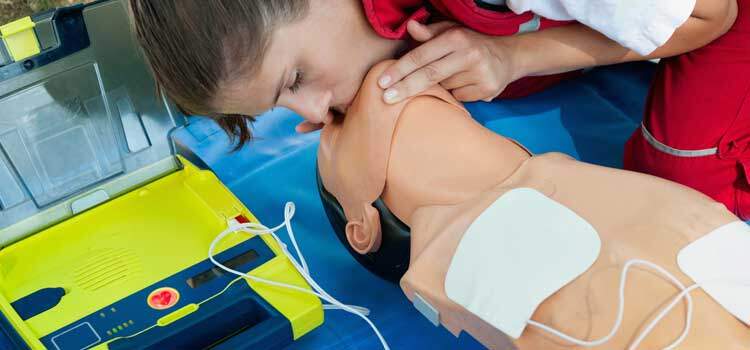Basic Life Support and Safe use of an AED Level 2 Qualification – Did you know that after a cardiac arrest, the chances of survival for a casualty decrease by 10% without CPR and defibrillation? It is important to have knowledge of Basic Life Support and the safe use of an AED (Automated External Defibrillator).
Sudden cardiac arrest is one of the UK’s biggest killers, and yet statistics show that most of the British public are unaware of the life-saving difference they can make by performing CPR and defibrillation.

This qualification will equip learners with the necessary skills to administer Basic Life Support in a safe, prompt and effective manner.
Delivered directly in your workplace for a group of up to 6-12 delegates – Call us on 0151 515 0416 to discuss your requirements and pricing.
Delivered directly in Liverpool and surrounding areas.
Who is this Basic Life Support and Safe use of an AED (Automated External Defibrillator) training suitable for:
This accredited training course is for people who have a specific interest or responsibility at work, or in voluntary and community activities. Furthermore, to give the necessary skills and knowledge to provide basic life support when dealing with an emergency situation which may involve using an Automated External Defibrillator. This course is suitable for health care workers and prior first aid knowledge is not required to attend. It serves as a basic module. Delivered directly in your workplace anywhere in Liverpool, Merseyside and the North West.
Duration: 4 hours in duration.
Course content:
On successful completion of the Training course, delegates will be able to carry out basic life support with the aid of an AED unit to a competent and safe standard. Deal with incident safety management and know how to maintain and test the equipment used. Basic Life Support and Safe use of an AED – Course topics include:
- Chain of survival
- Assessing an incident
- Casualty assessment
- Managing an unresponsive casualty
- Recovery Position
- Cardiopulmonary resuscitation CPR
- AED safety considerations
- Using an AED
- Combining AED use with CPR
- Using an AED on a child
- Procedures for when Emergency Services arrive
Assessment and Certification:
The Qualification is nationally recognised and Ofqual regulated. This means that you can be rest assured that your Training is of the highest quality. On successful completion of this course delegates will receive a Level 2 Award in Basic Life Support and Safe Use of an AED (Automated External Defibrillator) accredited certificate valid for 1 year.
For more information on our training courses please email us. Or why not call us on 0151 515 0416 and ask to speak with one of our experienced training consultants.
Guidelines suggest rotation every 2 minutes. Ensure early help and early access to AED as a priority. Early defibrillation remains a priority: Defibrillation within 3-5 minutes can produce survival rates as high as 50-70%. Continue compressions post defibrillation – the AED will generally prompt you.
Please visit the Resuscitation Council (UK) website for further information on having an Automated External Defibrillator in your business.
